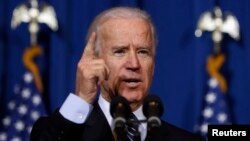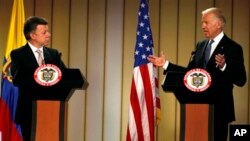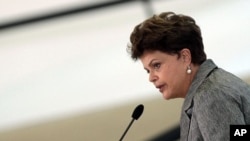RIO DE JANEIRO —
U.S. Vice President Joe Biden began a three-day visit to Latin America's biggest country on Wednesday to meet Brazilian government and business leaders as Washington gears up for a planned state visit by President Dilma Rousseff later this year.
The trip, part of a week-long swing by Biden through South America and the Caribbean, comes as Brazil's economy is slowly rebounding from a two-year lull following nearly a decade of sturdy growth.
The country, the world's seventh largest economy, seeks more clout with the United States and other major economies that it increasingly sees as its peers.
After divergences over trade, Middle East policy, and other differences during the administrations of their predecessors, Rousseff and U.S. President Barack Obama in recent years have gradually forged closer diplomatic ties in hopes that the two biggest economies in the Americas can increasingly become larger markets for one another.
Rousseff, however, has remained a vocal critic of loose U.S. monetary policy, which she believes hurts Brazil's economy by strengthening Brazil's currency and thus making Brazilian products more expensive abroad.
Nevertheless, the two countries have made incremental progress in commercial areas ranging from agriculture to energy to aviation and space technology.
In recent weeks, leaders of major U.S. and Brazilian companies involved in trade between the two countries have been lobbying both governments to work on more of the small agreements that over time could add up to wholesale progress for bilateral business.
“Everybody's looking for building blocks to bring the countries closer together,” said one U.S. official who spoke on condition of anonymity. “It's indicative of how people are trying to give greater structure to our trade and investment.”
Strenghtening ties
The strengthening ties between the two countries is underscored by an expected state visit by Rousseff to Washington in October, the first by a Brazilian leader in two decades. While Rousseff has already been on official business to the United States as president, the full state visit will last longer and involve more and closer diplomacy.
Biden's visit began in Rio de Janeiro, where he will address local authorities and business executives mid-day and tour a research facility operated by state-run energy company Petroleo Brasileiro SA, or Petrobras. On Thursday he is scheduled to visit a hillside Rio slum before flying to Brasilia, the capital, for meetings Friday with Rousseff and Brazilian Vice President Michel Temer.
Among many pending business issues between the United States and Brazil are a longstanding effort to ease visa restrictions for travel between the two countries, lingering disagreements over trade barriers and a push by U.S. companies for protection of intellectual property rights in a Brazilian marketplace rife with pirated software and technology.
Meanwhile, Washington is still urging Brazil to back Boeing Co., the U.S. aerospace manufacturer, on a planned purchase to upgrade its fighter jet fleet. Brazil, for its part, is eager to get U.S. backing for long-coveted permanent seat on the United Nations Security Council.
After a visit by Obama to Brazil in March 2011, the White House said it recognized Brazil's ambitions at the United Nations, but stopped short of backing its call for a place on the council.
Earlier this week Biden visited Colombia and Trinidad and Tobago.
The trip, part of a week-long swing by Biden through South America and the Caribbean, comes as Brazil's economy is slowly rebounding from a two-year lull following nearly a decade of sturdy growth.
The country, the world's seventh largest economy, seeks more clout with the United States and other major economies that it increasingly sees as its peers.
After divergences over trade, Middle East policy, and other differences during the administrations of their predecessors, Rousseff and U.S. President Barack Obama in recent years have gradually forged closer diplomatic ties in hopes that the two biggest economies in the Americas can increasingly become larger markets for one another.
Rousseff, however, has remained a vocal critic of loose U.S. monetary policy, which she believes hurts Brazil's economy by strengthening Brazil's currency and thus making Brazilian products more expensive abroad.
Nevertheless, the two countries have made incremental progress in commercial areas ranging from agriculture to energy to aviation and space technology.
In recent weeks, leaders of major U.S. and Brazilian companies involved in trade between the two countries have been lobbying both governments to work on more of the small agreements that over time could add up to wholesale progress for bilateral business.
“Everybody's looking for building blocks to bring the countries closer together,” said one U.S. official who spoke on condition of anonymity. “It's indicative of how people are trying to give greater structure to our trade and investment.”
Strenghtening ties
The strengthening ties between the two countries is underscored by an expected state visit by Rousseff to Washington in October, the first by a Brazilian leader in two decades. While Rousseff has already been on official business to the United States as president, the full state visit will last longer and involve more and closer diplomacy.
Biden's visit began in Rio de Janeiro, where he will address local authorities and business executives mid-day and tour a research facility operated by state-run energy company Petroleo Brasileiro SA, or Petrobras. On Thursday he is scheduled to visit a hillside Rio slum before flying to Brasilia, the capital, for meetings Friday with Rousseff and Brazilian Vice President Michel Temer.
Among many pending business issues between the United States and Brazil are a longstanding effort to ease visa restrictions for travel between the two countries, lingering disagreements over trade barriers and a push by U.S. companies for protection of intellectual property rights in a Brazilian marketplace rife with pirated software and technology.
Meanwhile, Washington is still urging Brazil to back Boeing Co., the U.S. aerospace manufacturer, on a planned purchase to upgrade its fighter jet fleet. Brazil, for its part, is eager to get U.S. backing for long-coveted permanent seat on the United Nations Security Council.
After a visit by Obama to Brazil in March 2011, the White House said it recognized Brazil's ambitions at the United Nations, but stopped short of backing its call for a place on the council.
Earlier this week Biden visited Colombia and Trinidad and Tobago.












